

Resource Investing News - The leading source of business news, financial information and analytical tools on the resource market. Energy Funds Advisors. Jabre Capital Partners S.A. Winton Capital. Commodity trading advisor. Characteristics[edit] Trading activities[edit] Compensation[edit] A CTA is often compensated through management fees calculated as a percentage of equity in the fund and profit incentive fees calculated as a percentage of new trading profits.
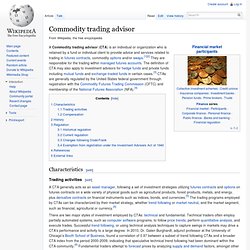
Usually no incentive fees are charged if the CTA does not generate a profit exceeding a hurdle rate or high-water mark.[8][9] History[edit] In the United States, trading of futures contracts for agricultural commodities dates back to at least the 1850s.[10] The first Federal regulation aimed at futures trading was proposed in the early 1920s, leading to the passage of the Grain Futures Act in 1922.
In July 2010, the definition of commodity trading advisor under the Commodity Exchange Act was expanded by the Dodd-Frank Wall Street Reform and Consumer Protection Act to include "persons who provide advice on swap transactions". Collective investment scheme. The values and performance of collective funds are listed in newspapers An investment fund is a way of investing money alongside other investors in order to benefit from the inherent advantages of working as part of a group.
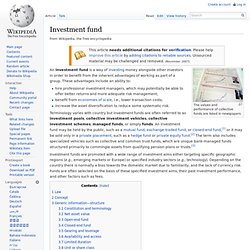
These advantages include an ability to: hire professional investment managers, which may potentially be able to offer better returns and more adequate risk management;benefit from economies of scale, i.e., lower transaction costs;increase the asset diversification to reduce some systematic risk. John Arnold Closes His Hedge Fund Centaurus Capital. BlueGold closes and returns funds to investors. Armajaro - Careers. New Finance Opus Commodities Fund of Funds Tops Feri Ranking. Dec. 18 (Bloomberg) -- New Finance Capital LLP’s Opus Commodities Fund managed by David Mooney topped the performance ranking of 45 funds of commodity hedge funds surveyed by Feri Institutional Advisors GmbH, an investment adviser.
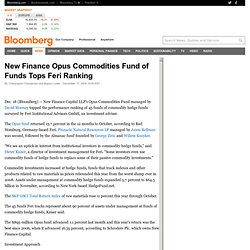
The Opus fund returned 15.7 percent in the 12 months to October, according to Bad Homburg, Germany-based Feri. Pinnacle Natural Resources LP managed by Jason Kellman was second, followed by the Almanac fund founded by George Zivic and Willem Kooyker. “We see an uptick in interest from institutional investors in commodity hedge funds,” said Dieter Kaiser, a director of investment management for Feri.
“Some investors even use commodity funds of hedge funds to replace some of their passive commodity investments.” Commodity investments increased at hedge funds, funds that track indexes and other products related to raw materials as prices rebounded this year from the worst slump ever in 2008. BLENHEIM COMMODITY FUND LLC: Real-time News Feed - MarketBrief. Commodities Corporation. Commodities Corporation (frequently referred to as "CC") was a financial services company, based in Princeton, New Jersey that traded actively across various commodities.
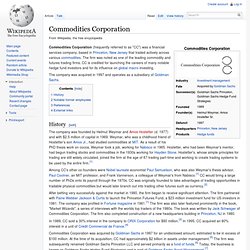
The firm was noted as one of the leading commodity and futures trading firms. CC is credited for launching the careers of many notable hedge fund investors and for its influence on global macro investing. The company was acquired in 1997 and operates as a subsidiary of Goldman Sachs. History[edit] The company was founded by Helmut Weymar and Amos Hostetter (d. 1977) and with $2.5 million of capital in 1969.
Among CC's other co-founders were Nobel laureate economist Paul Samuelson, who was also Weymar's thesis advisor, Paul Cootner, an MIT professor, and Frank Vannerson, a colleague of Weymar's from Nabisco.[1] CC would bring a large number of PhDs onto its payroll through the 1970s. After betting very successfully against the market in 1980, the firm began to receive significant attention. Clive Capital LLP - global commodities fund management. Amaranth, un hedge fund au tapis - Boursonomics.
Greenwich Village, Connecticut, cité maudite pour les hedge funds : déjà en 1994, LTCM, le fond spéculatif le plus fameux au monde y avait élu domicile, et sa faillite exemplaire demeure dans les mémoires.
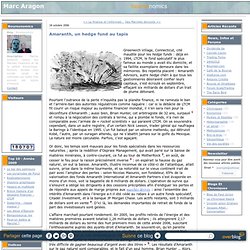
Bis repetita placent : Amaranth Advisors, autre hedge chéri à qui tous les gestionnaires désiraient confier leurs capitaux, s’est écroulé en septembre, effaçant six milliards de dollars d'un trait de plume détonant. Pourtant l'outrance de la perte n'inquiéta pas la planète finance, ni ne rameuta le ban et l'arrière-ban des autorités régulatrices comme naguère : car si la débâcle de LTCM fit courir un risque majeur au système financier mondial, il n’en sera rien pour la déconfiture d’Amaranth ; aussi bien, Brian Hunter, cet arbitragiste de 32 ans, surpayé 1 et rompu à la négociation des contrats à terme, qui a plombé le fonds, n’a rien de comparable avec l’armée de « rocket scientists » qui paraient LTCM. L’affaire marchait pourtant rondement. Amaranth Advisors. Amaranth Advisors LLC was an American multi-strategy hedge fund founded by Nicholas Maounis and headquartered in Greenwich, Connecticut.
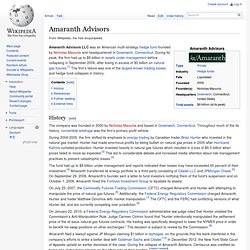
During its' peak, the firm had up to $9 billion in assets under management before collapsing in September 2006, after losing in excess of $5 billion on natural gas futures.[1] The firm's failure was one of the largest known trading losses and hedge fund collapses in history. History[edit] The company was founded in 2000 by Nicholas Maounis and based in Greenwich, Connecticut. Throughout much of the its history, convertible arbitrage was the firm's primary profit vehicle. On January 22, 2010, a Federal Energy Regulatory Commission administrative law judge ruled that Hunter violated the Commission's Anti-Manipulation Rule.
References[edit]